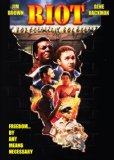| Reviews & Columns |
|
Reviews DVD TV on DVD Blu-ray 4K UHD International DVDs In Theaters Reviews by Studio Video Games Features Collector Series DVDs Easter Egg Database Interviews DVD Talk Radio Feature Articles Columns Anime Talk DVD Savant Horror DVDs The M.O.D. Squad Art House HD Talk Silent DVD
|
DVD Talk Forum |
|
|
| Resources |
|
DVD Price Search Customer Service #'s RCE Info Links |
|
Columns
|
|
|
Riot (1969)
Beautiful set-up...for almost no pay-off. Olive Films, a fun independent that has been releasing some cool Paramount library titles of late, has released Riot, the 1969 drive-in prison flick starring Jim Brown and Gene Hackman. Anyone who's read my reviews knows I live for this kind of movie (right time period, right stars, right kind of crude, base, exploitative subject matter), so if anyone was primed for a Riot revival, it was me. But something terrible happens to Riot after its first half-hour, and it never recovers: it gets dull. No extras for this great-looking transfer.
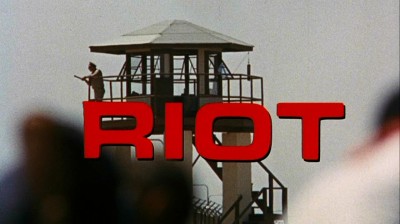
Arizona State Prison, America, 1969. In the broiling, suffocating heat of the desert, 35 of the prison's most violent, recalcitrant cons are coiled, waiting to spring. Led by charismatic Red "Big Red" Fraker (Gene Hackman), the inmates of the prison's isolation block, buoyed by the absence of Warden Eyman (Frank A. Eyman), who's vacationing in Hawaii, make their move, taking over the block with the reluctant help of non-plussed, supremely collected Cully Briston (Jim Brown). Known as a "troublemaker" by racist, cowardly screw, Grossman (Gerald S. O'Loughlin), Cully was unfairly thrown into isolation by Grossman who, also taking advantage of the warden's absence, bull-headedly ignores security protocols and unwittingly "opens the door" to the larger riot taking place. Once the isolation block is secured, what's next? With the sage advice of Cully, Big Red hits on a plan: mask the "riot" as a political demonstration aimed at unfair conditions in the joint, and while the opportunistic politicians, the self-important journalists, and the naive, clueless social workers and psychologists fruitlessly debate amongst themselves, the cons dig, hoping to escape the prison walls through an old, abandoned escape tunnel.
MAJOR PLOT SPOILERS!
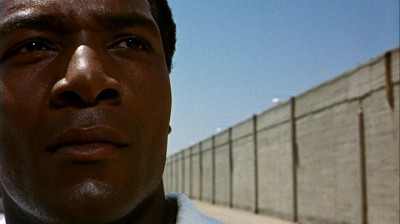
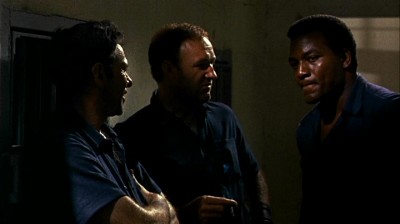
Sounds pretty cool, right? Well, that's what I thought, too. Riot is one of those minor B-action titles that I've always known about, but one that somehow slipped through the cracks (if the old man saw it at the drive-in, I was way too young to remember it). The director, Buzz Kulik, is certainly known to vintage TV drama fans, having directed episodes for countless series such as Gunsmoke and Have Gun, Will Travel, and I enjoyed his no-nonsense, energetic handling of genre works like Warning Shot, Shamus, and made-for-TV classics, Brian's Song and Bad Ronald. Scripter James Poe was a heavyweight veteran, with classics like Around the World in 80 Days, Attack, The Big Knife, Cat on a Hot Tin Roof, and They Shoot Horses, Don't They?, under his belt. Director William Castle (The House on Haunted Hill), acting as producer here (Rosemary's Baby), certainly knew his way around a cheap budget and exploitative subject matter. I've never been that big a fan of Jim Brown; I've always found him unnecessarily stiff and humorless during his late 60s, early 70s heyday. However, he seemed perfectly suited for his role here, as a largely quiet, self-assured con who knows the score and who's going to look out for number one (he's actually quite good here). As for Hackman, you're reading a guy who, aside from catching everything he ever did, actually waited for crap like March or Die, The Domino Principle, and, um...Welcome to Mooseport to come out. So the prospect of watching prime-time Hackman as a con leader organizing a prison riot/escape gave me a serious case of the whim-whams. What could possibly have gone wrong, then, with Riot?
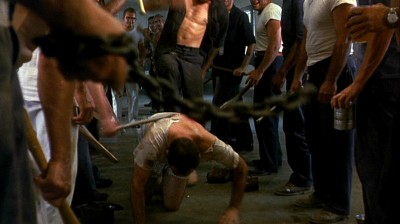
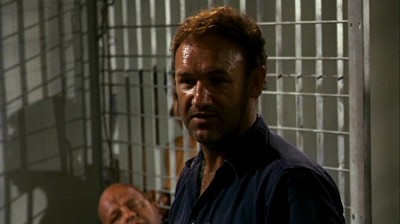
Well...first of all...there ain't no riot. Call me picky, but if the movie is called, Riot, I want to see one. I want to see cons plotting, and scheming, and passing information as they watch out for suspicious screws, dummying up when they walk by, only to tap out the rest on their rusty bars. I want to see the plan take shape, and I want the anticipation of the big moment to explode into violent, frenzied action, as the cons burst forth in a crazed bloodlust for freedom (as the totally spurious DVD cover art here suggests, making Riot look more like Shaft in Africa). Now, Riot is clever in having the main character, Cully, not be involved in the planning of the riot; instead, he stumbles upon the plot already in motion, as we're swept along with him as he tries to negotiate his way through conflicted feelings: keeping his cool because his parole is almost ready, and wishing to break out of the hated prison. Fine. That's cool, and Riot does an excellent job of setting up this sudden turn of events for Cully as he literally walks in on Big Red's operation, where he subsequently needs to keep the impulsive Red on an even keel for his own survival. But once the isolation block is taken, and the cons start breaking off into their own separate reveries, arguing over the instant realization that their half-assed plan is futile, the movie deflates faster than a souffle made with Bisquick®. Red's plan to snow the authorities as to the real nature of the fake-riot is novel, and we begin to think the film is going to be clever in undercutting the politics of Red's gambit. We're told the Warden is a sadist who gassed the cons in their cells before vacationing in Hawaii, and we don't have to think twice about who's in the right when Cully almost bashes disgusting weakling Grossman for his hard-assed policies (how great is it when Cully spots sniveling Grossman wetting his pants in fear?). In the film's 1969 context, then, we should be rooting for the cons to get one over on the system, a notion the film seems to want to throw back in our face by having Hackman admit it's all a scam, a dodge to cover a classic tunnel escape.
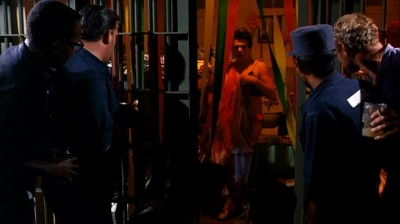
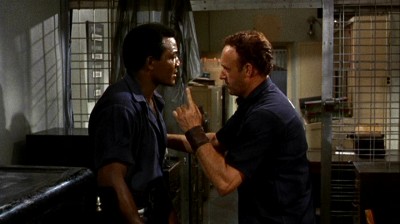
Disastrously, though, just at this moment where the film should have taken off into B-classic status by going into overdrive, Riot inexplicably cuts back its throttle and gets weird and vague and self-serious. Hackman becomes increasingly brooding and unenergetic as he starts to deconstruct, believing his own activist claptrap, while Cully, who should take over the film at this point, falls back into a contemplative funk, wandering aimlessly about the prison, either scheming to make some prison hootch with "mood elevators" in it (for reasons we're never told), or, um...questioning his sexuality as he appreciatively watches a drag queen strip before almost joining an intelligent, sympathetic homosexual con (Clifford David) in his bedroom cell. These developments are interesting, to say the least, and I would have welcomed their inclusion in Riot had Poe and Kulik taken care of business first and delivered a clear, coherent tone that gathered suspense as it moved from A to B, rather than winnowing it away. When Riot finally does shake off this seemingly interminable, fuzzy middle section and makes up its mind to be an actioner, rather than a poorly-worded, poorly-paced mood piece, it's surprisingly incompetent when compared to its tense opening. Kulik's a great technician, and with expert cinematographer Robert B. Hauser (The Odd Couple, A Man Called Horse, The Legend of Lizzie Borden), he crafts a few striking visuals, like Brown's daydream about freedom and bikini-clad women, and a remarkable shot of an inmate burrowing by inches out of the ground, like a rat. But the last act's action is poorly choreographed, with the tunneling scenes distinctly undernourished (only one little, tiny corner of tunnel is physically realized, to shabby effect), while the mowing down of the escaping prisoners is bloody, but also ridiculous (why are they crawling on their bellies like it's nighttime...at high noon in full view of the guards ten feet away???). Even worse is the demise of Hackman, treated as almost a rushed, hurried afterthought, just like Brown's escape. After the delicious anticipation of the first twenty minutes, and the grinding boredom of the long, long second act, these final spasms of Riot commit the worst sin of any exploitation film: the all-too brief "thrills"...aren't thrilling.
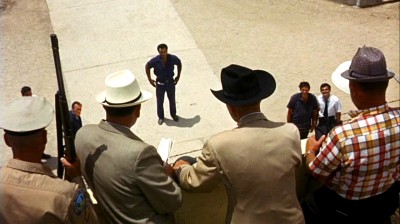
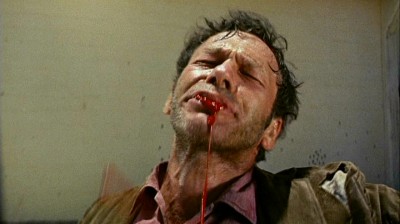
The DVD:
The Video:
Like other Olive transfers I've reviewed, the anamorphically-enhanced, 1.85:1 widescreen transfer for Riot looks terrific. Yes, there's the expected print damage at times, but they're minor anomalies; otherwise, the image is crystal-clear, with saturated colors, good picture detail, and blacks that hold. Looks great.
The Audio:
The English 2.0 stereo audio track is fine, with a solid re-recording level, little hiss, and effective (if sparse) separation effects. No subtitles or close-captions, though
The Extras:
No extras.
Final Thoughts:
A talky, shaky disappointment. Riot starts out like the kind of genre actioner that you've been praying for: tough, well-cast actors, a gritty subject matter, and pros behind the camera who set-up the whole thing beautifully. However...when Riot should have kicked into high-gear, someone must have decided it should "mean" something...and that's when the talking and the noodling and the brooding begins, and the fun just pisses away. Too bad. A rental for fans of Brown and Hackman, to make things complete, but for everyone else, Riot's entirely too quiet.
Paul Mavis is an internationally published film and television historian, a member of the Online Film Critics Society, and the author of The Espionage Filmography.


|
| Popular Reviews |
| Sponsored Links |
|
|
| Sponsored Links |
|
|
| Release List | Reviews | Shop | Newsletter | Forum | DVD Giveaways | Blu-Ray | Advertise |
|
Copyright 2024 DVDTalk.com All Rights Reserved. Legal Info, Privacy Policy, Terms of Use,
Manage Preferences,
Your Privacy Choices | |||||||









